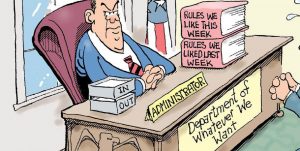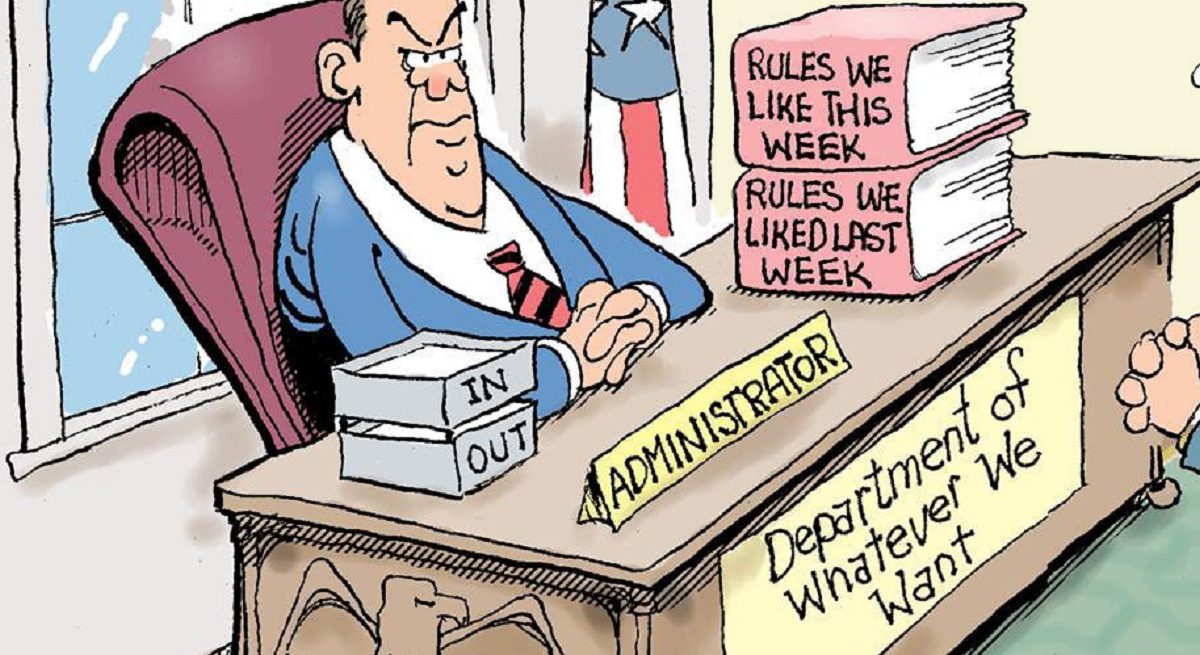The Mark of a Tyrant
The Mark of a Tyrant

 During the early 1980s, I read an article about a woman from the Soviet Union who had visited Washington, D.C. The woman was the wife of a top official in the Communist Government of the Soviet Union. While she was in Washington, D.C., the woman and some of her female friends from the Soviet Union were given a tour of several buildings and monuments. When they toured the Capitol Building, she said, “Ours is better.” When she saw the Washington Monument, she said, “Ours is better.” She made the same comment when she saw the Lincoln Memorial, the National Cathedral, and several other landmarks in Washington, D.C.
During the early 1980s, I read an article about a woman from the Soviet Union who had visited Washington, D.C. The woman was the wife of a top official in the Communist Government of the Soviet Union. While she was in Washington, D.C., the woman and some of her female friends from the Soviet Union were given a tour of several buildings and monuments. When they toured the Capitol Building, she said, “Ours is better.” When she saw the Washington Monument, she said, “Ours is better.” She made the same comment when she saw the Lincoln Memorial, the National Cathedral, and several other landmarks in Washington, D.C.
Later in the day, when they were on their way back to the hotel, the tour guide asked if it was okay to stop at a supermarket to pick up a couple of items that she needed. When they arrived at the supermarket, the tour guide asked the women if they would like to go into the supermarket with her. They said yes.
When they walked through the supermarket, they saw the produce, dairy, meat, and grocery sections of the store. The women were stunned by what was available for purchase. They were also stunned by the fact that there were numerous ordinary people who were filling their carts with items that were not even available to the top government officials in the Soviet Union.
At one point, the wife of the Soviet government official burst into tears. She knew that they had not stopped at the supermarket to take a tour or for the Americans to show off an American grocery store. They had simply stopped to pick up some items before returning to the hotel. But when she saw the abundant selection of high-quality foods that were available for reasonable prices to common, ordinarily citizens, her humiliation was so great that she broke down and cried.
During the few minutes that she was in the supermarket, she was able to see with her own eyes what capitalism had done for America. At the same time, she had no choice but to acknowledge in her own mind how much of a failure communism had been for the people of her country.
I could not find the article about what I just described to you, but I did find an article that described how Boris Yeltsin, a former member of the Communist Party of the Soviet Union from 1961 to 1990, and the first President of the Russian Federation, reacted when he walked through an American supermarket. The article describes how shocked Yeltsin was when he visited a Randall’s grocery store in Clear Lake, FL, in 1989. You can find the article here.
Two years after Yeltsin’s visit to the Randall’s grocery store, he left the Communist Party and set out to reform the economic system in Russia (the name that was given to Yeltsin’s country after the fall of the Soviet Union). Later in his own autobiography, Yeltsin wrote, “When I saw those shelves crammed with hundreds, thousands of cans, cartons and goods of every possible sort, for the first time I felt quite frankly sick with despair for the Soviet people. That such a potentially super-rich country as ours has been brought to a state of such poverty! It is terrible to think of it.”
Without actually saying it, Yeltsin acknowledged that the economic system of capitalism was far superior to communism.
The dictionary defines “capitalism” as “an economic and political system in which a country’s trade and industry are controlled by private owners for profit, rather than by the state.” The dictionary definition of “communism” is “a political theory derived from Karl Marx, advocating class war and leading to a society in which all property is publicly owned and each person works and is paid according to their abilities and needs.” The dictionary defines “socialism” as “a political and economic theory of social organization which advocates that the means of production, distribution, and exchange should be owned or regulated by the community as a whole.”
In Marxist theory, socialism has always been considered as the transitional social state between the overthrow of capitalism and the realization of communism.
A government cannot ordinarily replace capitalism with communism because the shift in the economic freedom of its citizens is too drastic. Before communism can be ushered in, there must first be a transition from capitalism to socialism. After that, it is only a matter of time before a communist or totalitarian government takes control.
Currently in the United States, the concept of socialism is aggressively being forced upon us by the major media outlets, the public school system, the celebrities in Hollywood, various high ranking officials in the Catholic Church and other religious organizations, large multi-national corporations, and of course, many of our national politicians.
The best formal definition of “capitalism” is from the Merriam-Webster dictionary: “An economic system characterized by private or corporate ownership of capital goods, by investments that are determined by private decision, and by prices, production, and the distribution of goods that are determined mainly by competition in a free market.”
The most important words in that definition are “private decision” and “free market.” What those words mean is that with capitalism, the government is not involved in making decisions as to what products and services are made available to the public for purchase.
According to George Gilder, an American economist and the author of the 1981 international bestseller, Wealth and Poverty, the key characteristic of capitalism is that it taps into the fundamental creativity of the human mind.
Gilder claims that “creativity always comes as a surprise to us,” which is why the results of capitalism are usually dynamic and unpredictable.
While creativity is the foundation of capitalism, government planning is the foundation of socialism.
According to Gilder, the problem with government planning is that it is always “based on the assumption that we already know all we need to know in order to plan our future.” When a government takes control of planning the future of its citizens, its actions always lead to tyranny, which results in the unlimited power to control and oppress its citizens.
Think about this: It was the creativity of individuals in America, combined with the freedom to make their own decisions that led to the invention and widespread use of electricity, trains, the railway system, automobiles, airplanes, telephones, TVs, air conditioning, iPhones, and Google. If government planners had been in control, none of those items and industries would have ever been invented.
More on this topic next week.




1 Comment
Harry, this is a wonderful explanation, and I have learned much that I didn’t know. I look forward to next week’s continuation about these terms. With lots of love for you and your family. Sister Roberta